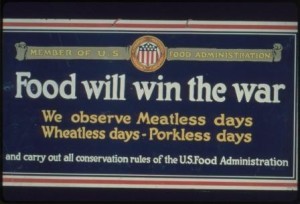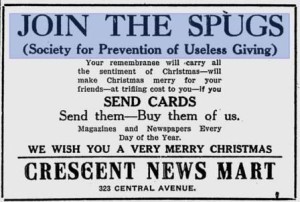By Mick Woodcock
The war put a crimp in the Holiday celebrations in 1917. Not only were some families missing members who were gone in direct support of the war effort, but also a number of other factors conspired to dampen yuletide spirits.
Food rationing was becoming a greater reality. The December 19, 1917, Weekly Journal-Miner published a notice: “NEW MEATLESS DAY ADDED TO SCHEDULE. The addition of another meatless day to the week’s schedule, the inauguration of baconless breakfasts and the use of less sugar and animal fats are called for in a revised conservation program which Timothy A. Riordan as Federal Food Administrator for Arizona is asked to make effective in this state, according to an announcement made today [December 14].”

The paper then printed the updated list, which included meatless Tuesdays, meatless Fridays, baconless breakfasts every day, wheatless Wednesdays, one wheatless meal each day, and decreases in the use of sugar and butter, cream and lard. The good news in all of this was that the word “meat” referred to beef, pork and mutton, not fish and poultry. The traditional Christmas turkey was safe from rationing as an approved “meat” substitute. Wheat substitutes were corn, oats, rye and potato flour. Vegetable oil replaced animal fats.
An article in the October 31, 1917, Weekly Journal-Miner voiced another economy move, this one aimed at Christmas. The article stated:  “’Join the Spugs’ is the latest economy movement that is spreading over the entire United States. The Spugs in its initials stands for the Society for the Prevention of Useless Giving, probably one of the greatest extravagances of the American people today. One hundred million dollars are spent annually in the giving of Christmas presents when a card would serve the same purpose. One hundred million dollars are also spent in giving Christmas presents in a reciprocal attitude, and joining the Spugs means nothing more than the proper economy in the distribution of Christmas gifts.”
“’Join the Spugs’ is the latest economy movement that is spreading over the entire United States. The Spugs in its initials stands for the Society for the Prevention of Useless Giving, probably one of the greatest extravagances of the American people today. One hundred million dollars are spent annually in the giving of Christmas presents when a card would serve the same purpose. One hundred million dollars are also spent in giving Christmas presents in a reciprocal attitude, and joining the Spugs means nothing more than the proper economy in the distribution of Christmas gifts.”
It continued, “Christmas this year should only be for our immediate family and our soldiers and sailors. If you have no soldier boy or sailor boy in your immediate family, your opportunity to give to them for Christmas is through the Y.M.C.A. army work or through the Red Cross, the two ministering angels to our army and navy.”
Some local men who had joined the First Arizona Infantry and were in training at Camp Kearney in California were able to get passes to come home for Christmas. Mentioned in the newspaper were Frank Dyer, Clarence Moffitt, and James Oneal. Local cowboy and broncobuster Harry Henderson and Camp Verde cowboy Jess Campbell were listed as returning home having received physical disability discharges.
The newspaper also reported on an event on the Plaza. “One of the biggest entertainments events ever recorded in this city, at least in the minds of the juvenile portion of the population was the municipal Christmas tree ceremonies held on Sunday evening on the plaza. About 500 persons were present to enjoy the program of Christmas numbers which had been prepared and Santa Claus himself was there to announce the speakers and singers, the program being in charge of F. A. Lindhorst of the Boy Scouts. The main feature of the evening was the singing of a number of Christmas carols, the old-time songs being rendered by choruses from the churches and public schools. Revs. Hoyt, Hamilton and Shires also took part in the services. This is the second time the municipal tree services have been held, and owing to the great popularity of the move, it is believed that the pretty custom will be continued for a long time to come, the sight of the flashing Christmas tree and the presence of St. Nick being highly gratifying to the little fellows and to their elders as well.”
This appears to be the origin of the annual Courthouse lighting program that now happens the first Saturday of December. Although the Courthouse itself was not lighted until after World War II, the program of speeches and Christmas carols appears to be today much as it was back then.
“Days Past” is a collaborative project of the Sharlot Hall Museum and the Prescott Corral of Westerners International (www.prescottcorral.org). This and other Days Past articles are also available at www.sharlothallmuseum.org/library-archives/days-past. The public is encouraged to submit proposed articles to dayspastshmcourier@gmail.com. Please contact SHM Library & Archives reference desk at 928-445-3122 Ext. 14, or via email at dayspastshmcourier@gmail.com for information.


